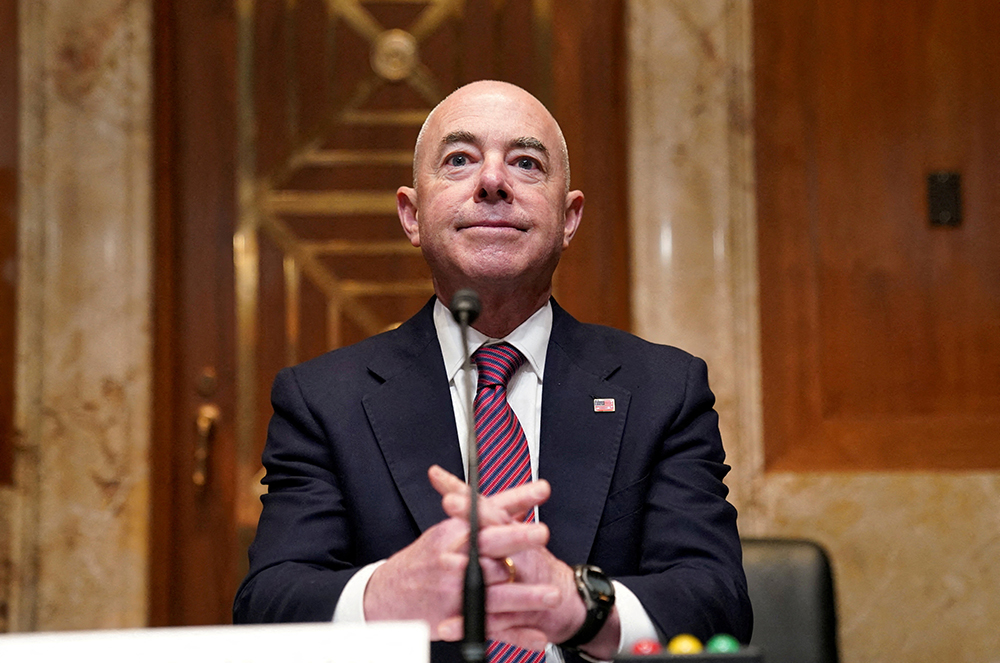
Homeland Security Secretary Alejandro Mayorkas takes his seat to testify before a Senate Appropriations Homeland Security Subcommittee hearing on the department's budget request on Capitol Hill in Washington, May 26, 2021. The House rejected an attempt to impeach Mayorkas over his handling of the border in a 214-216 vote Feb. 6, 2024. (OSV News/Reuters/Kevin Lamarque)
As congressional lawmakers appear to be at an impasse on immigration as a bipartisan border deal failed in the Senate and House Republicans failed to impeach Homeland Security Secretary Alejandro Mayorkas, Catholic immigration advocates will continue to pursue "humane and just solutions," one such advocate told OSV News.
Ronnate Asirwatham, director of government relations for Network, a Catholic social justice lobby, told OSV News Feb. 7 that "advocacy is slow, we understand that, and so we just keep on at it."
"I always explain it as you know, advocacy is like water on a stone — but if you keep dropping the water, you can shape the stone," she said.
In the Senate, a long-anticipated border security deal failed Feb. 7 during a procedural vote amid opposition from many Republicans.
The approximately $118 billion emergency national security bill would have sent aid to Ukraine as that nation fends off Russia's invasion and implemented strict new migration policies for the U.S.-Mexico border, among other measures. But Catholic migration advocates expressed concern about the implications of the proposed legislation, particularly for those seeking asylum.
Senate Majority Leader Chuck Schumer, D-New York, said in Feb. 7 remarks on the Senate floor that he would hold the vote anyway to ensure members were on the record with their position.
"Today, senators face a decision several months in the making," Schumer said. "Will Senate Republicans vote to start debate, just a debate, on bipartisan legislation to strengthen America's security, stand with Ukraine and fix our border, or will they cow to Donald Trump's orders to kill this bill?"
Despite original arguments that the border deal should be tied to funding aid for Israel and Ukraine, Republicans in the Senate and the House who are aligned with former President Donald Trump, the frontrunner for the Republican presidential nomination, eventually rejected the deal. Despite his own hardline stance on immigration policy, Trump has argued passing the bill would aid President Joe Biden in the November election.
Advertisement
However, Catholic immigration advocates also criticized the border provisions, including Bishop Mark Seitz of El Paso, Texas, chairman of the U.S. Conference of Catholic Bishops' Committee on Migration, who wrote in a Feb. 6 letter to Senate leadership that the bill was "flawed, both in terms of substance and form."
Asirwatham said it has given her hope that faith communities have been united in criticism of the bill and sought to "provide solutions to Congress about how this could be done better."
"The hope that I have is that we can continue that," she said.
Meanwhile, in the House, GOP leadership brought impeaching Mayorkas up for a vote Feb. 6 due to their criticisms of his handling of U.S.-Mexico border policy, but that vote failed as Republicans lacked the votes to pass that effort.
The 214-216 vote came as a surprise and was seen as a blow to House Republicans who sought Mayorkas' removal. Three Republicans — Reps. Ken Buck of Colorado, Mike Gallagher of Wisconsin and Tom McClintock of California — joined Democrats in rejecting the impeachment, leaving Republicans, with a razor-thin majority, without the votes to impeach Mayorkas.
Mia Ehrenberg, a spokesperson for the Department of Homeland Security, said in a statement that the "baseless impeachment should never have moved forward."
"If House Republicans are serious about border security, they should abandon these political games, and instead support the bipartisan national security agreement in the Senate to get DHS the enforcement resources we need," Ehrenberg said. "Secretary Mayorkas remains focused on working across the aisle to promote real solutions at the border and keep our country safe."
House Speaker Mike Johnson, R-Louisiana, indicated he would attempt to impeach Mayorkas again.
"Last night was a setback, but democracy is messy," Johnson told reporters Feb. 7.
Matthew Green, a professor of politics at The Catholic University of America in Washington who studies Congress and American elections, told OSV News that Republicans "looking to November are concerned that a major immigration reform bill might remove one of the weapons in their political arsenal."
"This is something they think they can win votes on, an open border as it were, and tightening that border takes that argument away from them," Green said, calling it "a classic dilemma" for political parties in election years.
Green noted this Congress had held an increasing number of what political scientists call "disappointment votes" — or votes on measures that are not expected to pass to force members to take a position, or where "you didn't count the votes well, or you're counting on the minority to defeat this thing."
Immigration reform has long proved elusive in Congress. The last major immigration reform package was signed by then-President Ronald Reagan in 1986, while his successor, President George H.W. Bush, signed a more modest package four years later.







